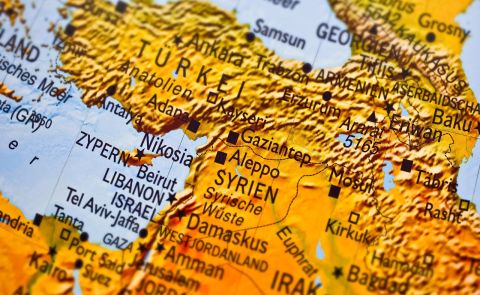
Georgia and US: From Close Ties to Caution

The relationship between Georgia and the United States has reached a pivotal moment. The unpredictability of US foreign policy raises concerns about Washington's diminishing influence in the South Caucasus. At the same time, Georgia's shift toward multi-vector foreign policy creates a new, rather uncomfortable reality on the ground for the US and the EU.
For the US, the South Caucasus has long been a region of geopolitical tension, exacerbated by unresolved conflicts and competing strategic interests. Washington traditionally views the region as a crucial corridor for energy and trade between Asia and Europe. Indeed, the Baku–Tbilisi–Ceyhan pipeline remains a key conduit for Caspian oil to Western markets. Similarly, the Baku–Tbilisi–Erzurum pipeline facilitates natural gas exports from the Caspian basin to Europe in circumvention of Russia – Washington’s chief competitor in the heart of Eurasia.
This rendered Georgia extremely important for the United States. Moreover, Georgia’s planned deep-water port in Anaklia aims to strengthen the country’s role as a logistical hub. Yet, with Georgia now taking steps that suggest a recalibration of its foreign policy from thoroughly pro-Western to something that can be described as multi-vector, the decision to award the Anaklia port construction contract to a Chinese-Singaporean consortium is indicative of shifting momentum in Tbilisi’s approach to regional geopolitics. Indeed, though Georgia was granted EU candidate status in December 2023, its political trajectory has been in flux ever since. Georgia’s growing economic engagement with Russia and China clearly indicates that the country’s foreign policy is amid its definitive diversification.
This does not mean, however, that a formal diplomatic rapprochement with Moscow is imminent. In fact, due to the continuing occupation of Georgia’s Abkhazia and South Ossetia [Tskhinvali Region], restoration of diplomatic ties with Russia remains highly unlikely. For the West and especially the United States, the new reality in Georgia’s foreign policy calls for a new approach toward Tbilisi. Global geopolitical developments suggest that Georgia-US relations will continue to face challenges. For instance, Georgia’s engagement with China and its Belt and Road Initiative (BRI) provides economic opportunities, but it also raises stakes in Georgia’s relations with Washington. Given the latter’s exacerbating ties with China, US-Georgia relations are anticipated to undergo further strain in the forthcoming years.
Geopolitics dictates that Georgia will remain a crucial player in Washington’s regional strategy. Tbilisi’s ambitions still align with U.S. interests, particularly in strengthening the South Caucasus energy corridor and facilitating trade between Central Asia and Europe. This role has gained added significance due to the war in Ukraine and the rise of the “Middle Corridor,” which runs from the Black Sea to Central Asia via Georgia. Yet, a potential U.S.-Russia rapprochement could have broader implications, particularly for Ukraine and the South Caucasus. If Washington deprioritizes Ukraine, other states in Russia’s borderlands – including Georgia – could see reduced American engagement, making them more vulnerable to Russian influence.
Following a year of tense relations with Washington, Tbilisi still hopes that under Trump a revival in bilateral relations would take place. Normalization could indeed take place, given the expectations in Tbilisi that the Trump team will be less insistent on the promotion of democratic standards and human rights but rather will apply pragmatism to relations with Georgia. The transactional manner in bilateral relations now seems much more efficient.
Nevertheless, the issue encompasses a broader geopolitical landscape in Eurasia. While the Trump administration could indeed look forward to building cordial ties with Georgia and even Azerbaijan (with which relations under Biden soared), the broader US strategic focus is shifting away from the South Caucasus. Without significant Western investments or military commitments, Georgia and Azerbaijan may find Moscow’s growing influence more predictable to an increasingly disengaged West.
Given the ongoing volatility of US policy in Eurasia, shaped by major global developments such as the war in Ukraine and the exacerbating Israel-Iran relationship, the South Caucasus is unlikely to play a focal point in US foreign policy, despite its strategic location as a key energy and transport corridor. The US' shift from the wider Black Sea and perhaps even the European continent toward the Indo-Pacific region is inevitable. This in turn will allow other powers to fill in the emerging power vacuum in the South Caucasus.
Looking ahead, given this uncertainty around Washington’s foreign policy, Georgia is likely to continue pursuing a multi-vector foreign policy by navigating relationships with the US, Russia, China, and regional actors such as Turkey and Iran. It could even be argued that from a US perspective, one of the most viable strategies may be to support Georgia’s evolving balancing act. This will prevent any single power from dominating the South Caucasus, and the US could indeed retain crucial tools to project influence in the region as a peer competitor to Russia, China, and others.
Emil Avdaliani is a professor of international relations at the European University in Tbilisi, Georgia, and a scholar of Silk Roads. He can be reached on Twitter/X at @emilavdaliani.
See Also


Economic Cooperation Between Armenia and Georgia: Potential and Challenges Ahead

Russia and Occupied Abkhazia: A New Type of Relations

Armenia and Georgia Strengthening Trade and Infrastructure Under Global Shifts and Sanctions

Armenia's Public Debt Approaching 13 Billion Dollars: How Manageable Is It?

